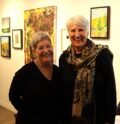Commentary
Listen before you leap
December 6, 2017
By Sarah Sobanski
I’ll be driving home and I’ll see someone walking down the street with a concerning gait. Automatically, I’ll think, “Oh, I wouldn’t want to meet him in a dark alley.”
Then, I’ll tell myself to stop it, “You don’t know their situation.”
A co-worker will tell a story of someone I’ve never met. This person, meaning to or otherwise, has wronged them somehow.
Later, I’ll see that person around town and scrunch up my nose, “They do look like they’d act like so-and-so said they did.” Tut-tut.
Again, I’ll shake my head. “You don’t know if you heard a biased version of that story or not.”
It’ll be print day, and I’ll be sitting behind the computer frustrated about something electronic not doing exactly what it’s supposed to at the exact moment I need it to. Then someone will ask me about a shoot or an event and I’ll go off, ranting and raving and exaggerating because it’s a way to blow off steam instead of breaking my computer into itty-bitty pieces.
Then, the poor person who’s had to listen to my tangent, will ask, “What?”
And I’ll sigh, “Nope. Don’t worry about it. Don’t want to bring more negativity into the world.”
Every day I catch myself slanting down a slope of negative assumptions, impressions and thoughts — and I’ll have to pull myself back. It’s an easy slope to teeter on – this world doesn’t necessarily encourage trust of others.
That being said, it’s important that I remind myself that I might not know the whole story — it’s my job find that out after all.
Over the last few weeks, there have been a few hyper local and controversial stories to report on in the community. In order to cover them, I’ve had to first swim through a sea of rumours and speculation.
I’d like to share a tidbit, from the tiny well of wisdom I’ve acquired over my humble career so far: one side always sounds more catastrophic without the other and 98 per cent of the time, it sounds worse than it is.
I can’t count how many times someone has walked into my office with a guilty verdict in hand. They know who did it, why they did it and they want you to know about it. For the record, so do I, if the wrong-doer is fundamentally wrong, cut and dry.
I will whole-heartedly believe this person that walks into my office crying contempt, until I call the other party and then it turns out the truth is threaded between both of them.
Before I pull out my philosophy minor and rattle off all the reasons why truth is relative, I want to take this moment you’re giving me to ask you to breathe before you blame.
We shouldn’t be judging books by their covers, perpetuating rumours, getting ahead of ourselves and/or jumping to conclusions — but your mother told you that, didn’t she? She might have also said nine times out of ten the easy route is the least rewarding.
That’s what gossip and negativity are — easy. No one wants to talk about how the washer broke because Tommy stuck his train in the basin again or that you’re on your way to an oil change. There’s no drama in that. We crave conversations instead about if Tommy’s mom has won her custody battle and if the mechanic is still sleeping with the receptionist.
Yes, people can be guilty. Yes, their intentions can be corrupt. Yes, people can manipulate others to believing their truth over yours — but so can we all.
We can so easily condemn people. Maybe because we’ve had bad experiences in the past, or maybe because we always seem to get the short end of the stick or maybe because we’re so used to thinking the worst it’s the only thing we can believe. But, if you’re champing at the bit and thinking about what you’re going to say next, you’re not listening. Without listening and understanding we’ll never work together and we’ll never get to the truth.
None of us need more drama, life is hard enough without constant scrutiny.

















